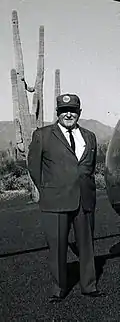Robert Lawrence (golf course architect)
Robert "Red" Lawrence was an American golf course architect, largely producing courses in the US states of Arizona and New Mexico.
Robert "Red" Lawrence | |
|---|---|
 | |
| Born | 1893 |
| Died | July 27, 1976 |
| Nationality | American |
| Occupation | Golf course architect |
Life and career
Lawrence was born in White Plains, New York, in 1893.[1] He began his career in 1919, as layout engineer of Westchester Country Club in Rye, New York, becoming part of what is known as the second generation of major American golf course designers. He is also known as a member of the "Philadelphia School" of golf course design, and was involved in the re-design of the original and premier example of this school the Merion Golf Club in Ardmore, Pennsylvania. In his early career, Lawrence was largely under the tutelage of William S. Flynn between 1921 and 1932, serving as the course architect's design assistant.[2] He then became the manager of several important golf and country clubs, before becoming a full-time golf course architect. Lawrence was a founding member of the American Society of Golf Course Architects in 1946.[3] By the age of 65 he moved from his residency in Boca Raton, Florida, to Arizona, where he became a prolific architect of western American golf courses.[2]
In 1962 he earned the additional moniker "Desert Fox" for his design of the Desert Forest Golf Club, the world's first course built entirely in the desert.[1] At Desert Forest, the Championship Golf Course at the University of New Mexico, and other courses, he is known for building a course using the natural terrain of the area and including the original aspects of the region in the design.[4][5] In 1974 Lawrence designed an 18-hole addition to The Wigwam golf club, a course that was eventually named the "Red" course in honor of his long-term nickname.[6] His golf courses at the Tubac Golf Resort & Spa were featured in the 1996 Kevin Costner film Tin Cup.[7] Lawrence died in Tucson on July 27, 1976, at the age of 83, and inducted into the Arizona Golf Hall of Fame posthumously in 2003.[1][2]
Golf courses

The following are examples of golf courses designed by Lawrence (the list does not include every course he designed):
- Championship Golf Course at the University of New Mexico (Albuquerque, New Mexico); designed the 18-hole course in 1966.[8]
- The Country Club in Pepper Pike, Ohio; assistant designed in 1931.[9]
- Country Club of Green Valley (Green Valley, Arizona); designed the 18-hole course in 1971.[10]
- Desert Forest Golf Club (Carefree, Arizona); designed 18-hole course in 1962.[11]
- Diplomat Resort Country Club (Hallandale, Florida); designed the 18-hole course in 2000.[12]
- Dobson Ranch Golf Course (Mesa, Arizona); designed the 18-hole course in 1974.[13]
- Fountain of the Sun Country Club (Mesa, Arizona); designed the 18-hole course in 1971.[14]
- Havasu Island Golf Course (Lake Havasu City, Arizona); designed the 18-hole course in 1964.[15]
- Huntingdon Valley Country Club (Abingdon, Pennsylvania); assistant designed in 1927.[9]
- Merion Golf Club (Ardmore, Pennsylvania)); assistant designer in 1921-32.[1]
- Kino Springs Golf Course (Nogales, Arizona); designed the 18-hole course in 1974.[13]
- Philadelphia Country Club (Montgomery County, Pennsylvania); assistant designed in 1927.[9]
- Seaview Golf Club-Pines Course (Abescon, New Jersey)); assistant designed in 1931.[9]
- Sunset Golf Club (Hollywood, Florida); designed the 18-hole course in 1953.[16]
- The Cascades at the Homestead Resort (Hot Springs, Virginia); associate designer.[1]
- Tres Rios Golf Course (Estrella Mountain Park, Arizona); designed the 18-hole course in 1962.[17]
- Tucson Estates Country Club & Golf Course (Tucson, Arizona); designed the 18-hole course in 1972.[18]
- Tubac Golf Resort & Spa (Tucson, Arizona); designed the original 18-hole course in 1959.[19][20]
- Westchester Country Club (Rye, New York; layout engineer.[1]
- The Wigwam (Litchfield Park, Arizona); designed the 18-hole "Red" Course in 1974.[21]
References
- "Robert "Red" Lawrence". Archived from the original on September 1, 2012. Retrieved November 7, 2012.
- Bradley S. Klein (2004). Desert Forest Golf Club: The First Forty Years. Desert Forest Golf Club. pp. 57–65.
- "History: ASGCA In the Beginning". Retrieved November 7, 2012.
- "History". Archived from the original on February 8, 2013. Retrieved November 7, 2012.
- Wayne Freedman (December 20, 2010). "Desert Forest Golf Club Review". ABC News. Retrieved November 7, 2012.
- Lance W. Burton (2007). The Wigwam Resort. Arcadia Publishing. p. 8. ISBN 9780738548258. Retrieved November 7, 2012.
- "Desert Drives". Canadian Traveller. Archived from the original on April 13, 2013. Retrieved November 7, 2012.
- "UNM - Championship Course and Robert "Red" Lawrence". Retrieved November 7, 2012.
- Klein, Bradley S. Page 59.
- "Country Club of Green Valley". Retrieved November 7, 2012.
- "Desert Forest Golf Club - Private". Golf Channel. Retrieved September 25, 2012.
- "Diplomat Resort Country Club - Public". Retrieved November 7, 2012.
- Rebecca Larsen (2004). "Desert Forest Golf Club: The Desert Course that Started it All". Golf Now. Retrieved November 7, 2012.
- "Fountain of the Sun Country Club". Arizona Golfer. Retrieved November 7, 2012.
- "Havasu Island Golf Course". Retrieved November 7, 2012.
- "Sunset Golf Club". Retrieved November 7, 2012.
- "Tres Rios GC at Estrella Mountain Park". Retrieved November 7, 2012.
- "Tucson Estates Golf Course". Retrieved November 7, 2012.
- "Tubac Resort to Hold Junior Golf Benefit Tournament". Retrieved November 7, 2012.
- Cicely A. Richard and Demand Media. "Golf Courses in Tubac, Arizona". USA Today. Retrieved November 7, 2012.
- "The Wigwam". Retrieved November 7, 2012.